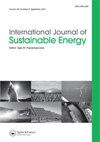妥协中的僵局,还是可再生能源规划中的多目标优化?利用情景-MCDA 进行利益相关者分析
IF 2.7
Q4 ENERGY & FUELS
引用次数: 0
摘要
摘要 能源和气候危机正在推动可再生能源的发展,但目前在主要国家却面临着障碍。由于在有争议的空间进行空间权衡,在区域层面平衡环境、社会和经济利益变得十分复杂。为了调查利益相关者是否愿意就风能和太阳能用地的联合排序达成妥协,我们探索了多标准决策分析(MCDA)规划支持。通过由两部分组成的利益相关者调查,确定了四个群体:对选址排名感到满意的 "拥护者"(66%)、尽管之前存在分歧但仍愿意妥协的 "现实主义者"(13%)、不接受排名的 "异议者"(35%)和不参与的 "教条主义者"。对(民主)规划和可持续发展的作用所持的不同态度是规划决策和利益相关者参与的基础。使用权衡分析可以确保规划决策的透明度,并追溯利益相关者的利益。然而,还需要考虑决策质量因素,以确保对规划进行全面反思。本文章由计算机程序翻译,如有差异,请以英文原文为准。
Gridlock in compromise, or is multi-objective optimisation possible in renewable energy planning? A stakeholder analysis using scenario-MCDA
ABSTRACT The energy and climate crises are driving renewable energy, but it is currently facing obstacles in leading countries. Balancing environmental, social and economic interests has become complex at the regional level due to spatial trade-offs in a contested space. To investigate stakeholder willingness to compromise on a joint ranking on wind and solar energy sites, multi-criteria decision analysis (MCDA) planning support was explored. Using a two-part stakeholder survey, four groups were identified: ‘advocates’ who were satisfied with the site ranking (66%), ‘realists’ who were willing to compromise despite previous disagreement (13%), ‘dissenters’ not accepting (35%), and ‘dogmatists’ not engaging. Planning decisions and stakeholder engagement are underpinned by distinct attitudes towards the role of (democratic) planning and sustainable development. The use of trade-off analysis can ensure transparency and trace back stakeholder interests in making planning decisions. However, decision quality factors also need to be considered to ensure a thorough planning reflection.
求助全文
通过发布文献求助,成功后即可免费获取论文全文。
去求助
来源期刊

International Journal of Sustainable Energy
ENERGY & FUELS-
CiteScore
5.70
自引率
3.20%
发文量
52
期刊介绍:
Engineering and sustainable development are intrinsically linked. All capital plant and every consumable product depends on an engineering input through design, manufacture and operation, if not for the product itself then for the equipment required to process and transport the raw materials and the final product. Many aspects of sustainable development depend directly on appropriate and timely actions by engineers. Engineering is an extended process of analysis, synthesis, evaluation and execution and, therefore, it is argued that engineers must be involved from the outset of any proposal to develop sustainable solutions. Engineering embraces many disciplines and truly sustainable solutions are usually inter-disciplinary in nature.
 求助内容:
求助内容: 应助结果提醒方式:
应助结果提醒方式:


